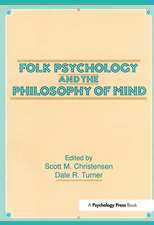Experienced Cognition
Autor Richard A. Carlsonen Limba Engleză Paperback – sep 1997
The book is divided into four parts. The first introduces the central themes and places them in the context of information-processing theory and empirical research on cognitive skill. The second develops the theoretical framework, emphasizing the unity of perceptual, symbolic, and emotional awareness and the relation of conscious to nonconscious processes. The third applies the experienced cognition framework to a variety of topics in cognitive psychology, including working memory, problem solving, and reasoning. It also includes discussions of everyday action, skill, and expertise, focusing on changes in conscious control with increasing fluency. The last concludes the book by evaluating the recent debate on the "cognitive unconscious" and implicit cognition from the perspective of experienced cognition, and considering the prospects for a cognitive psychology focused on persons.
This book addresses many of the issues raised in philosophical treatments of consciousness from the point of view of empirical cognitive psychology. For example, the structure of conscious mental states is addressed by considering how to describe them in terms of variables suitable for information-processing theory. Understanding conscious states in this way also provides a basis for developing empirical hypotheses, for example, about the relation of emotion and cognition, about the apparent "mindlessness" of skilled activity, and about the nature and role of goals in guiding activity. Criticisms of the computational view of mind are addressed by showing that the role of first-person perspectives in cognition can be described and investigated in theoretical terms compatible with a broadly-conceived information-processing theory of cognition.
Preț: 456.16 lei
Nou
Puncte Express: 684
Preț estimativ în valută:
87.29€ • 93.34$ • 72.78£
87.29€ • 93.34$ • 72.78£
Carte tipărită la comandă
Livrare economică 18 aprilie-02 mai
Preluare comenzi: 021 569.72.76
Specificații
ISBN-13: 9780805817331
ISBN-10: 0805817336
Pagini: 368
Ilustrații: illustrations
Dimensiuni: 152 x 229 x 24 mm
Greutate: 0.61 kg
Ediția:1
Editura: Taylor & Francis
Colecția Psychology Press
Locul publicării:Oxford, United Kingdom
ISBN-10: 0805817336
Pagini: 368
Ilustrații: illustrations
Dimensiuni: 152 x 229 x 24 mm
Greutate: 0.61 kg
Ediția:1
Editura: Taylor & Francis
Colecția Psychology Press
Locul publicării:Oxford, United Kingdom
Public țintă
ProfessionalCuprins
Contents: Preface. Part I: Experienced Cognition: Consciousness and Cognitive Skill. Experienced Cognition and the Cospecification Hypothesis. Consciousness and the Information Processing Framework. Phenomena of Cognitive Skill. Part II: The Structure of Consciousness and the Architecture of the Mind. Perceptual and Enactive Awareness. Symbolic and Representational Awareness. Emotion, Bodily Awareness, and the Unity of Consciousness. Awareness and Nonconscious Information Systems. Part III: Consciousness and Skilled Cognitive Activity. Working Memory: Private Speech and Other Performatory Vehicles of Thought. Controlling Cognitive Activity: Goals and Goal Structures. Causal Thinking and Problem Solving. Belief and Reasoning. Expertise, Skill, and Everyday Action. Practice and Conscious Control of Cognitive Activity. Part IV: Implications. Implicit Cognition and Automaticity: A Perspective on the "Cognitive Unconscious." Toward a Cognitive Psychology of Persons.
Recenzii
"The book is scholarly, insightful, and contributes to the lively current discussion about the nature of consciousness."
—CHOICE
"This book outlines a bold approach for reconciling phenomenological experience with current theories of cognitive psychology. Consciousness is treated as a useful, indeed critical component of cognition, rather than (as is typical) a pernicious thorn in the side of basic science which can be neither explained nor entirely dismissed. This integration of consciousness is accomplished through an ingenious melding of standard cognitive models with Gibson's theory of perception and philosophical analyses of intentionality. The result impressively illuminates how we might proceed to incorporate subjective perspective into scientifically grounded theories of mind."
—Jonathan Schooler
University of Pittsburgh
"Carlson does a very good job of making the case for why it is important for cognitive psychology to consider consciousness, skill acquisition, and the ecological perspective. This is a special accomplishment when writing about consciousness, a topic on which the writing is so often tangled and impenetrable; here, by contrast, the writing is both lucid and pithy. Although readers may not agree with everything the author has to say, they will certainly be better off for having read it."
—Michael Stadler
University of Missouri
—CHOICE
"This book outlines a bold approach for reconciling phenomenological experience with current theories of cognitive psychology. Consciousness is treated as a useful, indeed critical component of cognition, rather than (as is typical) a pernicious thorn in the side of basic science which can be neither explained nor entirely dismissed. This integration of consciousness is accomplished through an ingenious melding of standard cognitive models with Gibson's theory of perception and philosophical analyses of intentionality. The result impressively illuminates how we might proceed to incorporate subjective perspective into scientifically grounded theories of mind."
—Jonathan Schooler
University of Pittsburgh
"Carlson does a very good job of making the case for why it is important for cognitive psychology to consider consciousness, skill acquisition, and the ecological perspective. This is a special accomplishment when writing about consciousness, a topic on which the writing is so often tangled and impenetrable; here, by contrast, the writing is both lucid and pithy. Although readers may not agree with everything the author has to say, they will certainly be better off for having read it."
—Michael Stadler
University of Missouri
Descriere
This volume brings together cognitive scientific research on consciousness and on cognitive skills in a carefully-worked out theory of "experienced cognition." For researchers and graduate students in all branches of cognitive science.














